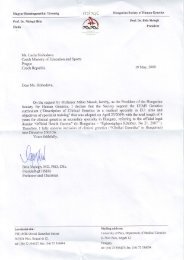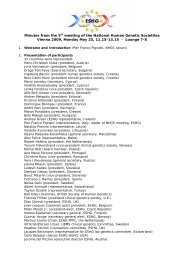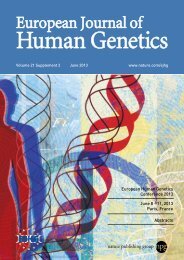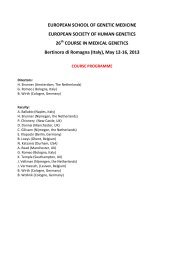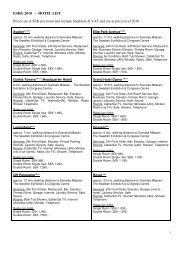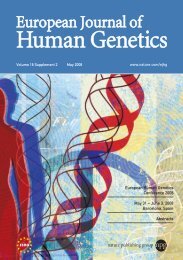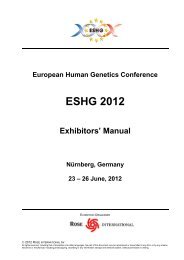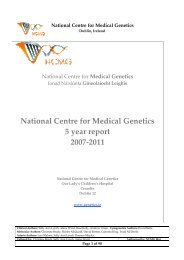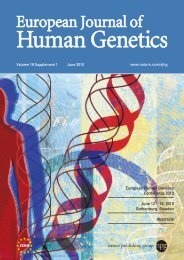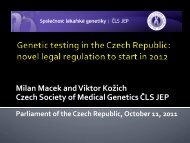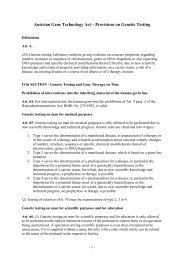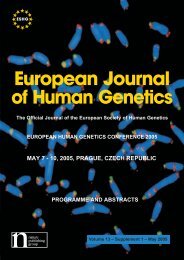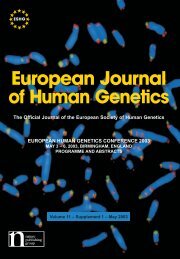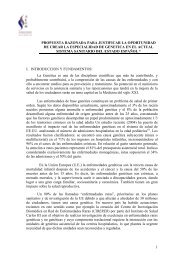2009 Vienna - European Society of Human Genetics
2009 Vienna - European Society of Human Genetics
2009 Vienna - European Society of Human Genetics
Create successful ePaper yourself
Turn your PDF publications into a flip-book with our unique Google optimized e-Paper software.
Genetic counseling <strong>Genetics</strong> education, Genetic services, and Public policy<br />
P01.45<br />
Rhombencephalosynapsis and related anomalies: the largest<br />
fetal series lead to suggest a <strong>European</strong> network.<br />
L. Pasquier 1,2 , C. Bendavid 3,2 , C. Evain 2 , I. Gicquel 2 , P. Loget 4 , C. Dubourg 3,2 , S.<br />
Jaillard 5,2 , S. Mercier 1 , A. Laquerrière 6 , V. David 3,2 , S. Odent 1 ;<br />
1 Medical <strong>Genetics</strong>, Rennes, France, 2 UMR6061 CNRS, Rennes 1 University,<br />
Rennes, France, 3 Molecular <strong>Genetics</strong> Lab, Rennes, France, 4 Pathology Lab,<br />
Rennes, France, 5 Cytogenetics Lab, Rennes, France, 6 Pathology Lab, Rouen,<br />
France.<br />
Rhombencephalosynapsis (RS) is a rare cerebellar malformation defined<br />
by vermian agenesis with fusion <strong>of</strong> the hemispheres and the dentate<br />
nuclei. Embryologic and genetic mechanisms are still unknown<br />
and to date , no animal models are available.<br />
We have created a RS database to carefully review the phenotype<br />
observed in France including familial, clinical, radiological and pathological<br />
patterns. The morphological analysis <strong>of</strong> 40 foetuses (Pasquier<br />
et al., <strong>2009</strong>, Acta Neuropathol 117: 185-200) allowed us to confirm<br />
that RS is always associated with other brain abnormalities and can<br />
be classified into three groups : 1- pure neurologic forms from isolated<br />
RS with hydrocephalus to supratentorial midline abnormalities<br />
(neural tube defect or holoprosencephaly), 2- syndromic forms with<br />
VACTERL-H association, 3- other syndromic conditions (Gomez-Lopez-Hernandez<br />
syndrome).<br />
We have also collected several postnatal cases without hydrocephalus<br />
or severe neurological symptoms. This might suggest that RS is underdiagnosed<br />
during prenatal or postnatal periods (less than 80 cases<br />
reported in the litterature). In order to precise its frequency, neurological<br />
prognosis and genetic counselling, we intend to create a <strong>European</strong><br />
network to gather most <strong>of</strong> the rhombencephalosynapsis cases and<br />
share the results provided.<br />
From DNA samples collected, this survey would also aim at looking<br />
for genetic factors using a pangenomic screening tool (CGH-array).<br />
This approach has already enabled us to identify 2 different microrearrangements<br />
from a series <strong>of</strong> 20 cases. Contact: laurent.pasquier@<br />
chu-rennes.fr<br />
P01.46<br />
should we screen for gene mutations in blood samples with<br />
mcH greater than 27pg in areas with a high prevalence <strong>of</strong><br />
thalassaemia?<br />
N. Saeidi, M. Jafarinejad, E. Shafieie, M. Mohammadi, M. Taghavi, F. Bayat, M.<br />
Karimi pur, A. Kordafshari, S. Zeinali;<br />
pateur Institution, Tehran, Islamic Republic <strong>of</strong> Iran.<br />
Screening strategies for thalassaemia carriers are usually based on<br />
cut <strong>of</strong>f values for red blood cell indices (either MCV or MCH).There<br />
is evidence for a higher sensitivity for MCH 27<br />
pg.<br />
Blood samples from 36 individuals with MCH greater than 27pg (MCV<br />
and Hb A 2 is normal too) were screened for presence <strong>of</strong> globin gene<br />
mutations and α globin gene deletions by ARMS PCR, Sequencing<br />
and Multiplex gap PCR.<br />
Twelve individuals harbored globin gene mutations. Of these, 3 had<br />
HbS, 2 had HbD, 2 had Cd75 mutations and 2 had deletions <strong>of</strong> one<br />
α globin gene. Three individuals have β thalassaemia major; that we<br />
believe because <strong>of</strong> transfusion these indices is normal.<br />
If one partner is found to be a carrier <strong>of</strong> a β thalassaemia mutation or<br />
single α gene deletion, it is advisable to look for HbS or α globin gene<br />
deletions in the other partner, even if MCH and MCV is within normal<br />
range.<br />
P01.47<br />
How do neurologists explain genetic causes <strong>of</strong> sporadic adultonset<br />
ataxia to patients ?<br />
Y. Ohnuki1 , A. Kondo1 , S. Izumi1 , M. Mizoguchi2 , S. Takagi1 ;<br />
1 2 Tokai University School <strong>of</strong> Medicine, Kanagawa, Japan, Tokai University<br />
School <strong>of</strong> Health Sciences, Kanagawa, Japan.<br />
The etiology <strong>of</strong> sporadic adult-onset ataxia is poorly understood, but<br />
Abele et al. reported that 13% <strong>of</strong> patients with negative family history<br />
have causative genetic mutations. We found two patients with SCA3<br />
mutation, who had a history <strong>of</strong> a family member(s) having been diagnosed<br />
with sporadic ataxia several years earlier.<br />
We studied how Japanese neurologists explained the genetic causes<br />
<strong>of</strong> sporadic ataxia to patients by referring to the clinical records. At<br />
the neurology clinic <strong>of</strong> Tokai University Hospital, 109 patients have<br />
been diagnosed with spinocerebellar degeneration (SCD) since 1990.<br />
Among them, 37 patients (34%) had positive family histories. Among<br />
the 72 patients with sporadic ataxia only 16 patients had received a<br />
clear explanation <strong>of</strong> the genetic causes from doctors, and 8 patients<br />
had received genetic tests (SCA1, 2, 3, 6, 17, DRPLA). Although no<br />
genetic mutations were found among sporadic ataxic patients who<br />
took these tests, mutations might have been present among those<br />
who did not take the tests. Family history may be negative because <strong>of</strong><br />
early death or late onset <strong>of</strong> parents, failure to diagnose SCD patients<br />
among family members, reduced penetrance <strong>of</strong> the mutant allele, or<br />
a de novo mutation for autosomal dominant ataxic gene. Neurologists<br />
should consider possible genetic causes <strong>of</strong> sporadic ataxia.<br />
P01.48<br />
Challenges in guiding first year medical students in a one<br />
semester genetic journey<br />
R. M. Dragotoiu, L. C. Bohiltea;<br />
Medical and Pharmacy University “Carol Davila”, Bucuresti, Romania.<br />
Teaching is considered a well defined activity, which helped us all<br />
achieve our knowledge, as also did our predecessors, and as, we assume,<br />
will have to do our followers. Changes in everyday life, technology<br />
development, but also changes in human mentality and/or view <strong>of</strong><br />
life, modified expectations in students as well as in teachers.<br />
The dynamics <strong>of</strong> the teaching process is still under study and consensus<br />
has not yet been reached on exactly what teaching techniques<br />
should be used, to deliver the information and help students reach<br />
knowledge on specialty aspects that might suit their own future medical<br />
practice. <strong>Genetics</strong> is studied only in the first year at the Medical and<br />
Pharmacy University “Carol Davila”, generating questions on the level<br />
at which it should be taught.<br />
Different questionnaires about the practicals were answered by 90<br />
Romanian and 38 foreign students. The last group was again divided<br />
because 15 students started later, had two practicals/ week instead <strong>of</strong><br />
the usual one, and had only one assistant lecturer, who also evaluated<br />
them at the end <strong>of</strong> the practicals. Also 38 foreign students, some <strong>of</strong><br />
which were also in the groups which received questionnaires about the<br />
practicals, were asked about the quality <strong>of</strong> 6 from 16 lectures.<br />
After analyzing the results one can conclude the necessity <strong>of</strong> a better<br />
connection between lectures and practicals, the latter having to loose<br />
the mostly theoretical topics, genetics being a proper field for applying<br />
different teaching methods even if students have various biology background<br />
knowledge from high-school.<br />
P01.49<br />
Development <strong>of</strong> timely and relevant training courses for<br />
healthcare pr<strong>of</strong>essionals and genetic researchers<br />
M. J. Leech 1,2 , F. Salway 3 , F. Jury 3 , P. Day 3 , D. Carthy 3 , L. Gaunt 4 , S. Hamilton 4 ,<br />
A. Wallace 5 , R. Elles 5 , D. vanGent 5 , A. Devereau 5 , J. Crolla 6 , M. Bottomley 2 , K.<br />
Mathieson 1,2 , W. Ollier 3 , M. Yuille 7 , D. Donnai 1,2 , H. R. Middleton-Price 1,2 ;<br />
1 Nowgen - A Centre for <strong>Genetics</strong> in Healthcare, Manchester, United Kingdom,<br />
2 Regional <strong>Genetics</strong> Service and Medical <strong>Genetics</strong> Research Group, Central<br />
Manchester University Hospitals NHS Foundation Trust & University <strong>of</strong> Manchester,<br />
Manchester, United Kingdom, 3 Centre for Integrated Genomic Medical<br />
Research, University <strong>of</strong> Manchester, Manchester, United Kingdom, 4 Regional<br />
Cytogenetics Unit, St Mary’s Hospital, Manchester, United Kingdom, 5 National<br />
<strong>Genetics</strong> Reference Laboratory and Regional <strong>Genetics</strong> Service, St Mary’s Hospital,<br />
Manchester, United Kingdom, 6 National <strong>Genetics</strong> Reference Laboratory,<br />
Wessex, Salisbury, United Kingdom, 7 UK DNA Banking Network, Centre for<br />
Integrated Genomic Medical Research, University <strong>of</strong> Manchester, Manchester,<br />
United Kingdom.<br />
Techniques for analysing genetic variants related to disease and treatment<br />
are constantly advancing, and allow ever more sophisticated and<br />
rapid analysis <strong>of</strong> patient samples. The consequence <strong>of</strong> greater access<br />
to these techniques is that many clinical and laboratory disciplines<br />
have to embrace the new technology.<br />
Nowgen, A Centre for <strong>Genetics</strong> in Healthcare, in collaboration with<br />
leading research and clinical scientists, has developed a portfolio <strong>of</strong><br />
accredited training courses for genetics pr<strong>of</strong>essionals involved in research<br />
and/or in the provision <strong>of</strong> clinical services. These courses have<br />
been developed following a thorough consultation with senior clinical



